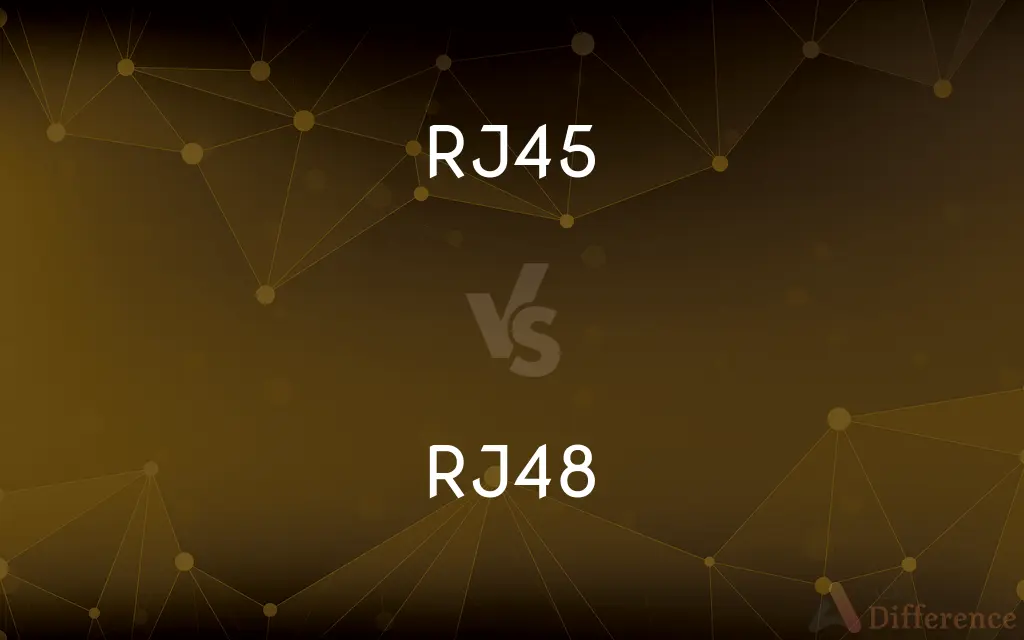RJ45 vs. RJ48 — What's the Difference?
By Tayyaba Rehman — Published on November 5, 2023
RJ45 and RJ48 are both connector types. RJ45 is commonly used for Ethernet and network connections, while RJ48 is typically used for T1 and ISDN terminations.

Difference Between RJ45 and RJ48
Table of Contents
ADVERTISEMENT
Key Differences
RJ45 and RJ48 are both standard types of connectors used in telecommunications. RJ45 is the more common of the two and is synonymous with Ethernet networking, being primarily used for data transfer in local area networks (LANs).
RJ48, on the other hand, is specialized and used primarily for T1 and ISDN terminations in telecommunication circuits. While RJ45 is familiar to many due to its widespread use in home and office networking, RJ48 is more niche, often found in professional telecommunications settings.
Both RJ45 and RJ48 connectors look very similar in appearance, as they are both 8-pin connectors. However, they are wired differently and have distinct pin assignments. This distinction is vital because using one in place of the other without proper wiring can lead to connectivity issues.
While RJ45 connectors are widely recognized in the realm of Ethernet networking, RJ48 connectors are seen less frequently by the general public. The latter is more likely to be encountered by professionals working on T1 or ISDN lines.
In conclusion, although RJ45 and RJ48 connectors may look alike, they serve different functions. RJ45 is predominantly used in Ethernet connections, while RJ48 is designated for certain telecommunication services.
ADVERTISEMENT
Comparison Chart
Primary Use
Ethernet & network connections
T1 and ISDN terminations
Commonly Found In
Homes & offices
Professional telecommunication settings
Pin Assignment
Standard Ethernet configurations
Specific to T1 & ISDN
Appearance
8-pin connector
8-pin connector (similar but wired differently)
Popularity
Widely used
Less common
Compare with Definitions
RJ45
RJ45 is a physical interface often used for patching into local area networks.
The router came with multiple RJ45 ports to accommodate several devices.
RJ48
RJ48 connectors are specialized for certain telecommunication circuits.
The technician ensured the RJ48 wiring was correct for the ISDN service.
RJ45
RJ45 is a standard interface for connecting twisted pair cables to network devices.
The technician replaced the old RJ45 socket with a new one to ensure better connectivity.
RJ48
RJ48 is an 8-pin connector typically used for T1 and ISDN terminations.
The telecom company used RJ48 jacks to set up the new T1 line.
RJ45
RJ45 is recognized by its distinct 8-pin design and is ubiquitous in data networking.
The broken RJ45 plug hindered the office's network connection.
RJ48
RJ48 interfaces are specifically assigned for T1 or ISDN services.
The IT department kept separate cables for RJ45 and RJ48 to avoid confusion.
RJ45
RJ45 is an 8-pin connector primarily used for Ethernet networking.
Many homes have RJ45 outlets to connect devices to the internet.
RJ48
RJ48 is designed for professional telecommunications settings.
Large businesses often have RJ48 connections for their dedicated lines.
RJ45
RJ45 connectors are commonly associated with Ethernet and LAN connections.
When setting up his computer, John realized he needed an RJ45 cable for a wired connection.
RJ48
RJ48, although similar in appearance to RJ45, has a different wiring configuration.
Mistaking RJ48 for RJ45 can result in connectivity problems.
Common Curiosities
How does RJ48 differ from RJ45 in usage?
RJ48 is typically used for T1 and ISDN terminations.
Are RJ45 and RJ48 connectors visually different?
They look very similar, both being 8-pin connectors, but they have different pin assignments.
What is the primary use of RJ45?
RJ45 is primarily used for Ethernet and network connections.
Can I use an RJ45 connector in place of an RJ48?
No, they have distinct wiring configurations, and using one in place of the other can cause issues.
Is RJ45 more common than RJ48?
Yes, RJ45 is widely used for home and office networking, while RJ48 is more niche.
Is RJ45 associated with Ethernet?
Yes, RJ45 is synonymous with Ethernet networking.
What are RJ48 connectors primarily seen in?
RJ48 connectors are primarily found in T1 or ISDN lines in professional settings.
How can I differentiate between RJ45 and RJ48?
By checking the wiring and pin assignments, as they are distinct for each.
Can I use an RJ48 cable for my home network?
No, for typical home networks, an RJ45 cable is appropriate.
Is RJ48 specific to any telecommunication services?
Yes, RJ48 is designated for T1 and ISDN services.
In what scenarios might I encounter an RJ48 connector?
You'd likely encounter RJ48 when dealing with T1 or ISDN telecommunications circuits.
Why is RJ48 less recognized by the general public?
Because RJ48 is mainly found in professional telecommunications settings, while RJ45 is prevalent in everyday networking.
Are RJ45 connectors easy to find?
Yes, RJ45 connectors are widely available due to their ubiquitous use in networking.
Do RJ45 and RJ48 have the same number of pins?
Yes, both have 8 pins, but they're wired differently.
Can misusing RJ45 and RJ48 cause connectivity problems?
Yes, using one in place of the other without proper wiring can lead to connectivity issues.
Share Your Discovery

Previous Comparison
Hard Iron vs. Soft Iron
Next Comparison
Trench Coat vs. RaincoatAuthor Spotlight
Written by
Tayyaba RehmanTayyaba Rehman is a distinguished writer, currently serving as a primary contributor to askdifference.com. As a researcher in semantics and etymology, Tayyaba's passion for the complexity of languages and their distinctions has found a perfect home on the platform. Tayyaba delves into the intricacies of language, distinguishing between commonly confused words and phrases, thereby providing clarity for readers worldwide.













































